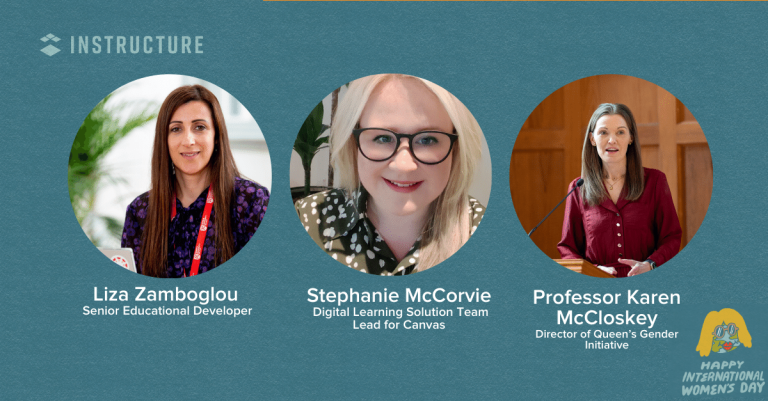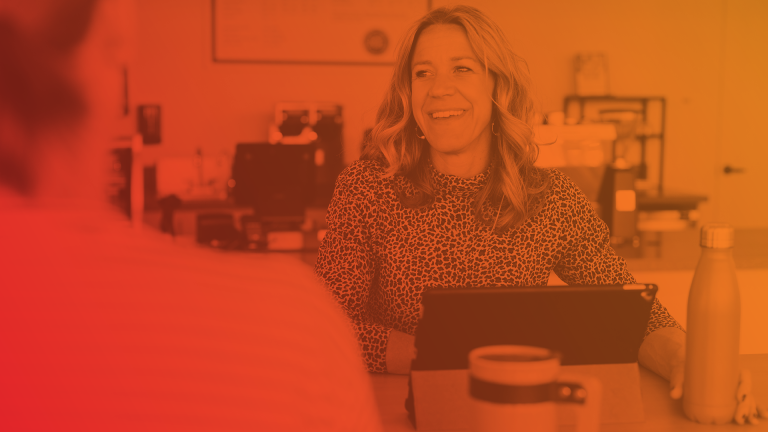
The theme for International Women’s Day 2024 is “Invest in Women: Accelerate Progress”. And so we thought it was only fitting that we check in with three leading women from Queen’s University Belfast, an institution renowned for its pioneering approach.
Queen’s was recently granted a Gold Athena Swan Award for its work in improving gender equality in Higher Education, making it the first university in Ireland and the second in the UK to achieve an institutional Gold Award. Remarkably, University Chancellor and US Secretary Hillary Rodham Clinton extended her congratulations to Professor Karen McCloskey, Director of Queen’s Gender Initiative (QGI).
We caught up with Professor Karen McCloskey and her colleagues Stephanie McCorvie, Digital Learning Solution Team Lead for Canvas, and Liza Zamboglou, Senior Educational Developer, to discuss how they’re investing in both themselves and other women, and accelerating their progress.
Can you tell us more about the Aurora programme at Queen’s University Belfast?
Stephanie: The Aurora Programme at Queen's, led by Advance HE, supports the University's commitment to promoting leadership development and career progression for women up to the Senior Lecturer level or the professional services equivalent.
Personally, participating in the Aurora Programme last year proved to be a transformative experience, empowering me to lead and navigate challenges with newfound insight and confidence. My primary motivation was to cultivate confidence by venturing beyond my comfort zone. I was eager to broaden my perspectives and learn from others with diverse experiences and backgrounds
What is the Queen’s Gender Initiative?
Karen: The Queen’s Gender Initiative (QGI) is a female-focused entity within our university. It's been running for almost 25 years, and we aim to advance the progression and participation of women across all areas of campus life - education, research, management and leadership. Amplifying the visibility and voices of women has been a key objective and we have changed the walls of Queen’s through commissioning portraits of prominent women that are displayed in the Great Hall and art projects across campus.
We established bespoke, holistic Mentoring Programmes for women, spanning our academic and professional services staff. Each year, 100 colleagues are in Mentee-Mentor relationships, and matches are made by the lead champions rather than by algorithms. We take the time to find out what the mentee would like to receive mentorship for, whether it's work-life balance, career progression, learning about the university and so on.
Liza: I have been a mentor on the QGI programme for the past two years and see the huge benefit for both mentees and mentors. It really is a lifeline for early career women, especially if they're working from home for part of the week. It provides them with personalised support and guidance from experienced mentors, boosting their professional growth, confidence, and sense of belonging. This connection, even in a virtual setting, creates a supportive network that offers encouragement and camaraderie, which is crucial for career progression.
How do you drive inclusion throughout the University, among students and staff?
Karen: QGI has championed initiatives, such as family-friendly policies and flexible working practices - which are mainstreamed and apply to anyone who might need to take family-related leave or avail of flexibility. Our PhD students have maternity leave provision, similar to staff. And the University has launched a Carer’s Passport - while women and men are caregivers, women are more likely to be carers. This document makes it easier for staff with caring roles to talk to their manager about the flexibility and support they need.
We run several workshops including imposter syndrome and active bystander training. This training helps both students and staff to speak up in situations where non-inclusive or inappropriate behaviours occur. We’ve even set up a learning module in our Canvas VLE for all academics to use in their courses. We also deliver training on bias awareness including unconscious bias because, of course, this exists throughout academia - whether it’s securing research funding or being given the same stretch opportunities as others.
Stephanie and Liza, what impact has the Aurora programme had on you?
Stephanie: The Aurora programme itself provides time and space for active reflection and focused development. You will only get out of it what you put in, so protect that time and make the best of the opportunity - it’s an investment in yourself. The facilitators and the guest speakers are all so authentic in sharing their experiences - it's inspiring. Of course, this empowerment has a ripple effect on the teams we are leading and the university groups that we contribute to. Before, I was less likely to speak up out from fear of judgement and now I go into situations thinking “Actually, I have a lot to bring to the table.”
Liza: Agreed. Participating in the Aurora programme was a truly transformative experience for me. It provided me with invaluable insights and perspectives, reshaping my professional identity in profound ways. So much so that I, alongside Steph, presented at InstructureCon in Denver last year, a conference with 3000 people! It was a moment where we realised we needed to step out of our comfort zone and claim our space. The feedback we got was amazing and it was such a confidence boost for us.
Throughout my career, imposter syndrome has been a challenge for me. While it's not something that vanishes overnight, the Aurora programme equipped me with strategies to confront it more effectively. One of the programme's most beneficial aspects was the opportunity to engage with a diverse group of accomplished women from different backgrounds facing similar challenges. This environment fostered candid conversations and a shared sense of solidarity, which was incredibly empowering.
What impact do you think The Queen’s Gender Initiative has had on the women in your institution?
Karen: QGI makes a tangible impact on women’s careers whether through Mentoring Programmes or Promotions Workshops. Women cite this provision as crucial to their career planning, personal development and subsequent promotions. Importantly, bringing women together whether in the QGI IWD Networking Lunch, earlier this week or events throughout the year nurtures a supportive culture and belonging.
We have come a long way as an institution, but the job's not done. 34% of our professors are women. Five years ago, it was 23%. So we're pushing hard. We all recognise the inequalities of the system that we come into, but it’s a system that wants to see change. Programmes like Aurora and the Queen’s Gender Initiative help us drive that change throughout the Higher Education sector and beyond.
Related Content
 canvas-biz-investment.jpg
canvas-biz-investment.jpgBlogs
 Upskilling and Reskilling Preparing Students for a Modernized Workforce.png
Upskilling and Reskilling Preparing Students for a Modernized Workforce.pngBlogs
 skills-forward.jpg
skills-forward.jpgBlogs
